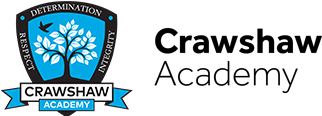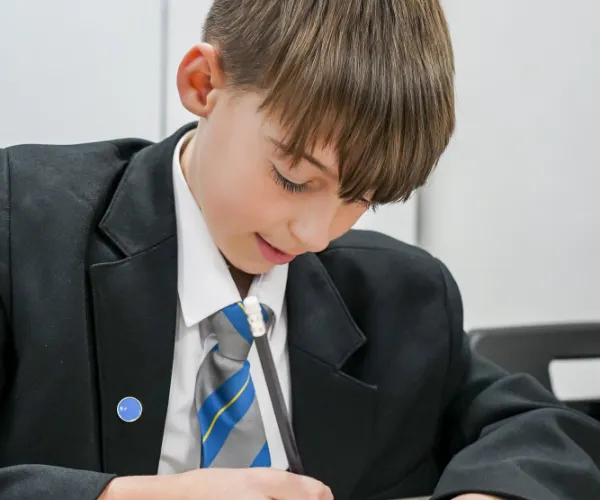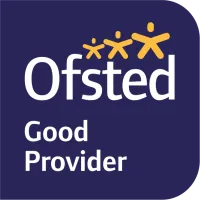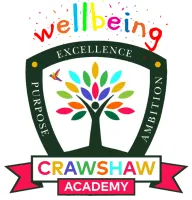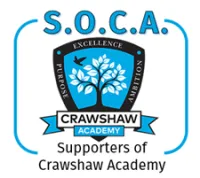Economic wellbeing is incorporated into the English curriculum through the exploration of themes related to money, class, and society in literature, as well as developing critical thinking and communication skills needed for future financial decision-making. Students might novels, plays, and poetry that address economic inequality, personal financial struggles, or the impact of wealth on individuals and communities, such as Charles Dickens' ‘Great Expectations’, Percy Shelley’s ‘England in 1819’, Willy Russell’s ‘Our Day Out’, and J.B Priestley’s ‘An Inspector Calls’. These texts prompt discussions about societal structures, personal choices, and economic justice. Additionally, English lessons involve activities such as persuasive writing or debating, where students may argue their viewpoint about economic issues or explore financial literacy topics, further enhancing their ability to articulate and critically assess economic concepts. This approach not only improves language skills but also deepens students' understanding of economic wellbeing and its relevance to their lives.
- Learning at Crawshaw
- Year 11 Revision
- The Crawshaw Curriculum
- Personal Development
- Subjects
- Homework/Independent learning
- Remote learning
- Exams Information
- Learning Resource Centre
- Post 16 Provision
- Future Ready/CEIAG
- Post 16 Provision
Economic Wellbeing
Financial Education and Economic Wellbeing
Financial education is any activity that helps young people develop the knowledge, skills and attitudes they need to;
-
manage money well;
-
make informed financial decisions; and
-
achieve personal goals
It covers a wide range of topics responding to the needs of young people, from:
-
payslips;
-
budget management; and
-
mortgages
to understanding the impact of money on;
-
relationships;
-
the difference between needs and wants; and
-
how to manage risk
Financial education will help young people meet these challenges and build foundations for future financial wellbeing and resilience. Young people who learn about managing money in school do better on many measures of financial capability than their peers. They are more likely to
-
save up frequently
-
have a bank account
-
be confident managing money
-
be a critical consumer
Economic wellbeing encompasses various dimensions including:
-
income;
-
wealth;
-
employment opportunities;
-
access to basic goods and services; social support; and
-
overall satisfaction with life.
Economic Wellbeing within the Crawshaw Curriculum
English
Mathematics
In mathematics we teach essential financial skills and concepts. Students learn practical topics such as percentages, interest rates, budgeting, and financial planning, which are directly applicable to managing personal finances. Lessons often include real-life scenarios, such as calculating loan repayments, understanding mortgages, or working out savings with compound interest, which help students develop financial literacy. These mathematical skills enable students to make informed economic decisions in their personal lives, preparing them to navigate adult financial responsibilities. By linking mathematical problem-solving with real-world financial situations, the curriculum fosters a strong foundation for economic wellbeing.
Science
Economic wellbeing is included in science by exploring the economic impact of scientific advancements and the role of science in addressing global economic challenges. In physics, students specifically investigate calculating the cost of electricity and examine how energy saving methods in the home can impact this. They calculate efficiencies of electrical devices, compare and evaluate to select for a specific purpose. They compare renewable and non-renewable energy resources and the sustainable effect on the global economy. In Biology, students examine the advantages and disadvantages of medical treatments for IVF, Coronary heart disease, kidney disease and genetic engineering, they also look at sustainability within ecosystems. In Chemistry, students carry out life cycle assessments on materials that have the same function comparing their sustainability and impact on the environment. We also look at socio-economic costs associated with methods of metal extraction, atom economy in producing pharmaceutical products and comparing methods of producing potable water. This approach helps students appreciate the broader economic context of scientific progress and encourages informed decision-making in both their academic and personal lives.
Geography
Economic wellbeing is a key theme in the Geography curriculum, as students explore the relationship between geography, economies, and the distribution of resources. Topics such as economic development, resource management and urban issues help students understand how economic activities are shaped by geographic factors and how these impact people's lives across different regions. Students examine the economic disparities between LICs, NEEs and HICs, the role of natural resources in shaping economies, and the effects of globalization on industries and employment. Lessons also cover concepts like urbanisation, economic migration, and the impact of environmental challenges such as climate change on economic stability. Through these topics, students gain a deeper understanding of how geography influences economic wellbeing, both locally and globally, and how geographic factors contribute to economic decision-making and development.
History
In History students examine the economic factors that have shaped societies, political movements, and global developments over time. Students study key historical events related to economics such as the Transatlantic Slave Trade, hyperinflation in 1920s Weimar Germany and the Great Depression of the 1930s, which had widespread economic and political consequences. In addition, the economic impact of other events such as the Dissolution of the Monasteries, the Renaissance and the Russian Revolution. Lessons explore the economic motivations behind imperialism, colonisation, and conflict, as well as the impact of economic policies like those of the welfare state or nationalised healthcare have on society. When considering political ideologies from across the political spectrum, their economic policies and principles are highlighted and explored (from the extremes of communism and fascism, to the more central policies of liberalism, socialism and conservatism). By understanding these economic forces, students gain insight into how financial systems and economic wellbeing have influenced historical change, helping them connect past events to contemporary economic issues and their own financial futures. This fosters a deeper awareness of how economic wellbeing shapes the course of History and society.
Religious Studies
Religious Studies examines ethical and moral perspectives on wealth, poverty, and economic justice through various religious teachings. Students explore how different faiths, such as Christianity, Islam, Hinduism, and Buddhism, approach the use of money, the responsibilities of charity, and the importance of fairness in economic dealings. For example, they may discuss concepts like Christian stewardship and the Islamic practice of Zakat (charitable giving). These discussions encourage students to reflect on the moral implications of economic decisions, personal responsibility in financial wellbeing, and the wider societal impact of economic inequality. By engaging with these ethical questions, students develop a balanced understanding of how religious values can inform attitudes toward money, generosity, and social justice, contributing to a broader view of economic wellbeing.
MFL
Economic wellbeing is incorporated into the Modern Foreign Languages (MFL) curriculum by exposing students to the economic landscapes and financial practices of countries where the target language is spoken. Through topics such as work, business, and trade, students learn vocabulary and phrases related to personal finance, employment, and commerce, enhancing their ability to navigate financial situations in a foreign context. Lessons may involve role-playing scenarios like buying and selling, discussing prices, or exploring job markets in different countries, giving students insight into how economies function globally. Additionally, by studying cultural attitudes toward work, saving, and spending, students gain a deeper understanding of how economic wellbeing is perceived and managed in different cultures. This not only builds language proficiency but also broadens their economic awareness on a global scale, fostering financial literacy in a multilingual context.
Design Technology and Art
In Design Technology, students learn about the costs of materials, production processes, and sustainable design, gaining an understanding of budgeting and cost-effectiveness in product development. They also explore the economic implications of design choices, such as how innovation and efficiency can impact marketability and profitability.
In Art, students may examine the role of the art market, the value of creative industries, and how artists and designers manage their careers financially. Discussions around the economics of mass production versus handcrafted items, or the impact of intellectual property on design, further develop students' understanding of economic wellbeing. This integration helps students see the connection between creativity, business, and financial sustainability in the world of design and art.
Food and Nutrition
Food and Nutrition teaches students how to make cost-effective and nutritious food choices. Lessons focus on the importance of working within financial constraints, comparing the cost of foods, and understanding how to shop wisely, such as using seasonal ingredients or minimizing food waste. Students also explore the economic factors influencing food production and distribution, such as fair-trade practices, food sustainability, and the environmental and financial impact of food choices. By learning these practical skills, students are better equipped to make informed decisions about nutrition and budgeting, which contributes to both their personal economic wellbeing and broader societal issues such as food security and sustainability.
Computing and Business
Business Studies
Business studies are directly linked to financial education and economic well-being. The subject focuses on areas such as:
Personal Finance Management
Students learn about financial concepts such as:
- Budgeting: Managing income and expenses.
- Saving and Investment: Understanding savings accounts, pensions, stocks, and other investment options.
- Credit and Debt: Responsible borrowing, understanding interest rates, and managing debt.
Economic Principles
Key economic ideas like supply and demand, inflation, and interest rates are introduced. Students gain insight into how these factors impact:
- Individual finances (e.g., purchasing power, cost of living).
- Broader economic environments (e.g., how economies function and what drives economic growth).
Entrepreneurship and Business Planning
Business studies often include lessons on entrepreneurship, where students:
- Learn how to start a business, write business plans, and understand market research.
- Develop skills in financial planning for business, including cash flow, profitability, and investment management.
- Understand risks and returns, preparing them for future financial decision-making.
Computing
Although computing might not be as directly associated with financial education, it contributes significantly to economic well-being through the development of digital literacy and skills necessary in the modern economy.
Digital Skills and Economic Competitiveness
With the increasing reliance on technology in all sectors, computing equips students with:
- Basic coding and programming skills, which can open up career paths in well-paying jobs in tech.
- Data analysis skills, enabling students to work with financial data and other economic information.
- Understanding of emerging technologies like AI, blockchain, and fintech, which are transforming the finance sector and economy.
Online Financial Management
In computing classes, students may also be introduced to:
- Digital tools for managing finances, such as online banking, budgeting apps, and investment platforms.
- Cybersecurity, which is crucial for protecting personal and financial information in an increasingly digital world.
- E-commerce platforms and digital marketing strategies that tie into business ventures, promoting entrepreneurship and financial independence.
Problem-solving and Logical Thinking
Computing teaches critical thinking and problem-solving skills, which can be applied to managing finances and making informed economic decisions.
Both subjects often promote:
- Numeracy: Students enhance their numeracy skills, essential for financial literacy.
- Decision-making: Students learn to evaluate options, assess risks, and make decisions, which is crucial for personal finance and entrepreneurship.
- Collaboration and Communication: Through group projects (e.g., business planning or tech development), students build interpersonal skills needed for professional environments.
Preparation for Future Employment
Both computing and business subjects help students understand the job market and equip them with essential skills for economic participation, such as:
- Developing career-related skills (entrepreneurship, digital competency).
- Gaining financial independence (through budgeting, investing, or running a business).
By combining these skills from Business and Computing, students are better prepared to manage their personal finances and succeed in the job market, contributing to their overall economic well-being.
Media
Media Studies plays a significant role in developing financial education and economic well-being by equipping students with critical skills and knowledge relevant to the digital and media-driven economy. Through Media Studies, students learn to analyse and interpret various media content, understanding the economic models behind media production, distribution, and consumption. They explore the role of advertising, marketing, music and film industries, and consumer behavior, gaining insights into how media influences financial decisions and market trends. Additionally, Media Studies often involves practical projects that require budget management, financial planning, and resource allocation, fostering essential financial literacy skills. By studying the economic impact of media industries and the digital economy, students become more informed consumers and potential contributors to the media sector, enhancing their economic well-being and preparing them for diverse career paths.
Physical Education
Physical Education (PE) indirectly contributes to financial education and economic well-being by promoting essential life skills such as discipline, teamwork, leadership, and goal-setting, all of which are valuable in the workforce and personal finance management. PE teaches students about the professional sports industry, providing insights into the economic opportunities available through careers in sports, fitness, coaching, and sports management. Additionally, by understanding the commercial aspects of sports, such as sponsorships, branding, and event management, students gain awareness of how these elements generate revenue and impact local and global economies. Furthermore, PE often encourages students to think about health-related financial planning, such as investing in personal well-being and the long-term economic benefits of maintaining a healthy lifestyle, including reduced healthcare costs and increased productivity.
Health and Social Care
Health and Social Care helps develop financial education and economic well-being by providing students with an understanding of the economic aspects of the healthcare and social care sectors. Students learn about the funding and financial structures behind healthcare systems, such as the NHS, and how economic factors influence public health and social care provision. By studying the cost of care services, the importance of budgeting in healthcare settings, and the financial impacts of aging populations or long-term care needs, students are encouraged to think critically about the economic challenges in these fields. This knowledge fosters financial awareness and prepares students for responsible decision-making, both in their personal finances and in potential future roles within the care sector.
Curriculum for Life
The skills needed to achieve economic well-being are taught throughout curriculum for life. The topics covered educate pupils on how to navigate life in the community and achieve a good standard of living and high quality of life.
In year 7 pupils are encouraged to think about what their aspirations for the future are and how they will achieve these. Consideration is given to potential careers and employability skills, with a focus on how to develop these.
These ideas are built upon in year 8 by exploring the advantages of working and the uses of money. The benefit system is explored, linking to our responsibilities within the community.
In year 9 pupils revisit their career ideas and look at the importance of aiming high. They learn about their financial choices, consumer rights and consider social responsibilities, such as human rights and concerns for people who are struggling in society.
Planning for the future is developed further in year 10, with lessons on employability and writing a CV. Pupils are encouraged to think about their financial survival and the choices they have. Managing money and budgeting are explicitly taught, as well as options for housing.
Year 11 pupils spend time considering their post 16 options and what is the best pathway for them. Applying for jobs and employability skills are reviewed.
Music
Music contributes to financial education and economic well-being by introducing students to the business aspects of the music industry, such as production, distribution, and promotion. Through understanding how musicians, producers, and managers generate income via royalties, live performances, streaming services, and merchandising, students gain insights into the financial workings of the creative economy. Music education often involves projects that teach budgeting for events, managing resources for recording or performance, and exploring career pathways in music-related fields, all of which enhance students' financial literacy. Additionally, students learn about intellectual property rights, copyright, and licensing, key concepts for protecting creative work and ensuring long-term financial benefits. These lessons prepare students for potential careers in music while equipping them with skills to navigate the financial realities of both creative industries and personal financial management.
Drama
Drama plays a role in developing financial education and economic well-being by exposing students to the business side of the performing arts industry. Through drama, students learn about the economics of theatre production, including budgeting for performances, managing costs for set design, costumes, and marketing, and the financial considerations of staging events. Students also gain an understanding of career opportunities in acting, directing, and production, along with insights into salary expectations, contract negotiations, and the importance of networking. Additionally, drama explores revenue streams like ticket sales, sponsorships, and grants, teaching students how the arts are financed. By understanding the financial and logistical aspects of running a production or creative venture, students enhance their financial literacy and entrepreneurial skills, which contribute to both personal financial management and broader economic well-being in the creative sectors
- Learning at Crawshaw
- Year 11 Revision
- The Crawshaw Curriculum
- Personal Development
- Subjects
- Homework/Independent learning
- Remote learning
- Exams Information
- Learning Resource Centre
- Post 16 Provision
- Future Ready/CEIAG
- Post 16 Provision
